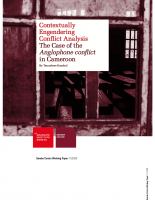Kauskal, Tanushree. 2020. Contextually Engendering Conflict Analysis: The Case of the Anglophone conflict in Cameroon. Working Paper 11 | 2020. Geneva: Gender Centre, The Graduate Institute of International and Development Studies.
This background paper is driven by the rationale of paying attention to structures and voices that are often unseen and unheard both during and after periods of conflict. The current ‘Anglophone conflict’ in Cameroon is being simplified to specific narratives. However, delving into the context reveals the structural and heterogeneous nature of the grievances being voiced during the conflict, particularly those of women. This paper seeks to perceive these disparate demands by embedding the conflict in its context and looking closely at two key historical junctures that have been significant in the shaping of the current conflict – the colonial period and the period of political and economic liberalisation in the 1990s. A historical assessment allows for generating a space of visibility for grievances that have been generally unseen. By embedding the research in its historical context, this paper arrives at the key clusters and threads of social, political and economic concerns that need to be perused further on the conflict field in order to understand the diversity of demands and concerns being raised.
Banner: © bmszealand / Shutterstock.com



